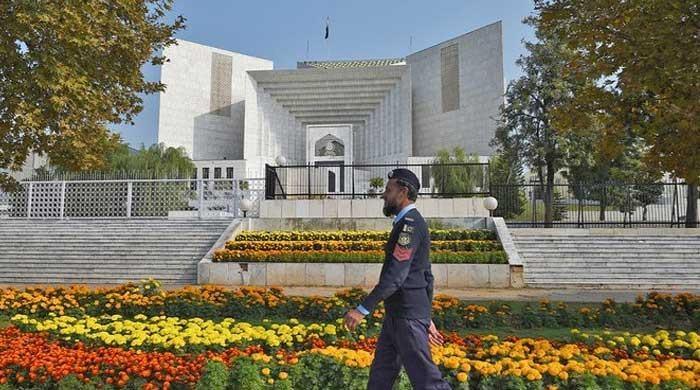- Ministry of Defense lawyer says precedent for military trial of civilians.
- Justice Mandokhail says the May 9 suspects were not even “ex-servicemen”.
- Justice Musarrat Hilali says fundamental rights of Pakistani citizens remain intact.
ISLAMABAD: Supreme Court Justice Musarrat Hilali on Wednesday noted that military trials were designed for culprits in cases like the Army Public School (APS) tragedy and questioned whether the same approach could be applied to all civilians.
The concern was raised during a hearing on internal court appeals of the military trial against civilians, under the Supreme Court’s Constitutional Court, presided over by Justice Amin-Ud-Din Khan.
The lawyer representing the Ministry of Defence, Khawaja Haris, who had been asked to continue his arguments from where he left off in yesterday’s hearing, read out the Supreme Court verdict that had declared the military trial against civilians invalid.
Haris argued that the precedent had already been established in previous cases that civilians could also be tried in military courts. He argued that the majority decision had misinterpreted Article 8(1). 3, and Article 8, subsection 5, of the constitution.
Justice Jamal Khan Mandokhail responded to this by saying that the bench would see whether it agrees with the counsel or not.
Haris argued that the interpretation wrongly suggested that the FB Ali case was of a different nature. He explained that Brigadier General FB Ali was tried after his retirement as he was a civilian.
Haris pointed out that the ruling said FB Ali had not retired at the time of the offence, making his case unique.
In addition, Judge Mandokhail noted that the accused in the current case, linked to the events of May 9, had no connection with the armed forces.
“Nowadays there is a term ‘ex-servicemen’ but these people were not even ex-soldiers,” he said, explaining that they were only civilians.
He went on to ask whether civilians could be tried under the Army Act and whether this only applied to specific citizens.
Haris responded by saying that the general view was different, but Judge Mandokhail urged him to ignore public opinion and directly decide whether civilians could be tried in military courts.
Here, Justice Hilali asked whether all fundamental rights would be suspended when the army law is applied, while Justice Mohammad Ali Mazhar asked about international practice and asked the defense ministry lawyer if he had any examples to provide.
With this, the lawyer confirmed that he had examples and would present them later.
Justice Mazhar also pointed out that the laws in the First Schedule could not be amended. Med Haris emphasizes the importance of applying the current law in this case.
Meanwhile, Justice Mandokhail raised the issue of military trials for the culprits of terrorist attacks in which a significant number of young Pakistani soldiers are martyred. Would they also face military trials, he asked, adding that why cases involving martyrs are not tried by military courts.
In doing so, Haris clarified that this matter was not concerned with who might be tried in the future.
Judge Mandokhail asked the extent to which civilians could be tried in military courts and what cases under Article 8, Section 3 would be eligible for trial by military courts.
Meanwhile, Justice Hilali stressed that Pakistan’s constitution has not been suspended and fundamental rights remain intact as evidenced by court rulings.
Haris confirmed that there are legal precedents to support this.
The Supreme Court, in its unanimous judgment by a five-member bench on 23 October 2023, declared civil trials in military courts null and void after it admitted the petitions challenging the trial of civilians involved in the 9 May riots.
However, on December 13, 2023, a six-member bench of the Supreme Court—with Justice Hilali dissenting from the majority—suspended its October 23 ruling on petitions challenging the earlier verdict.



